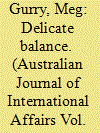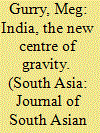| Srl | Item |
| 1 |
ID:
119075


|
|
|
|
|
| Publication |
2013.
|
| Summary/Abstract |
The Australia-India relationship has pivoted on more than the sale of uranium, and is not purely a narrative of neglect. While there have been some periods where bilateral relations received inadequate attention, the years 1947 to 1980 tell of a more complex story. During this time, many Australian diplomats and leaders worked hard to include India in Australia's foreign policy calculations. However, it proved difficult, arguably impossible, to negotiate a path for the Australia-India connection through the complexities of the India-Pakistan relationship and the strategic uncertainties of this most fragile of regions. Indian leaders, not without cause, constantly accused Australia of a 'tilt' to Pakistan. An examination of the Australian archives for this period reveals the inhibiting effects of the India-Pakistan conflict, particularly over Kashmir, on the development of a more fruitful Australia-India collaboration.
|
|
|
|
|
|
|
|
|
|
|
|
|
|
|
|
| 2 |
ID:
114012


|
|
|
|
|
| Publication |
2012.
|
| Summary/Abstract |
Australia-India relations continue to puzzle foreign policy analysts. The reasons for stronger ties seem obvious, yet each successive Australian government has proved unable to forge the links necessary for more fruitful collaboration. Prime minister John Howard made two visits to India. His second visit in 2006-when he expressed unqualified enthusiasm for India's fast-growing economy and for the development of a new centre of gravity for the world, the emerging 'global middle class' of China and India-promised to change the language of engagement from neglect to partnership. This paper examines the context of the changing relationship, looks at the role of leadership in the formulation of foreign policy, and asks whether the momentum developed from Howard's visit was deep and strong enough to sustain the shocks ahead-the 2009 attacks on Indian students and the reversal of the decision on the sale of uranium-and to maintain a position for Australia in India's growing global engagement.
|
|
|
|
|
|
|
|
|
|
|
|
|
|
|
|